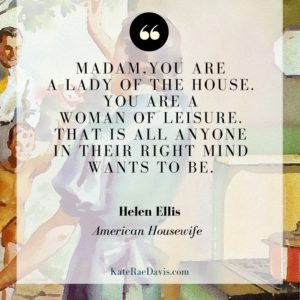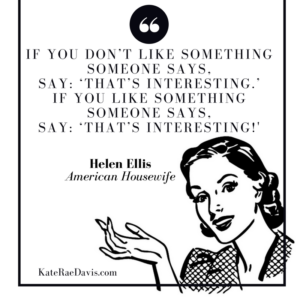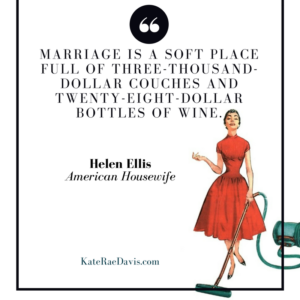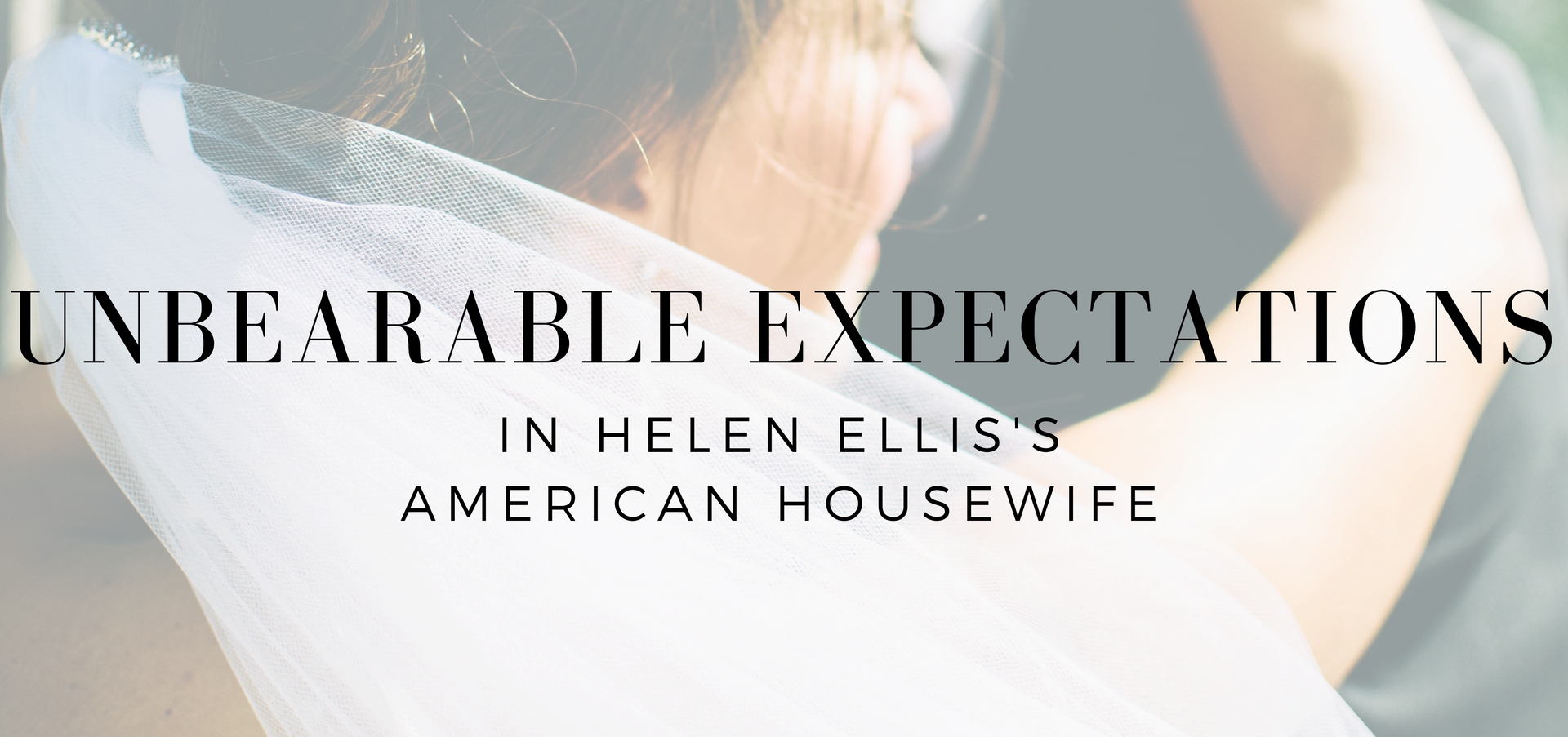What does being a wife mean? How does the role of wife impact a woman’s identity?
These are the core questions we address in a bi-monthly in a project called Literary Wives. We read novels with an eye on what they have to add to our understanding of what it means to be a wife and a woman.
Our most recent pick: American Housewife: Stories by Helen Ellis. Check out other thoughts and reviews on the same novel from Literary Wives bloggers! You can find them all through the Literary Wives page.
American Housewife is a despair-filled look at how USAmerican society defines success for women today.
The collection could have easily been called American Woman. The emphasis in the title on “housewife” highlights what her characters reveal again and again: our narrative for the peak of success for a woman in America is to become a housewife.
 In one story, “How to Be a Patron of the Arts,” the best friend of a would-be writer tells her “Madam, you are a lady of the house. You are a woman of leisure. That is all anyone in their right mind wants to be.” The statement is silently in the foreground of every story in the work.
In one story, “How to Be a Patron of the Arts,” the best friend of a would-be writer tells her “Madam, you are a lady of the house. You are a woman of leisure. That is all anyone in their right mind wants to be.” The statement is silently in the foreground of every story in the work.
“A woman of leisure.” Her time is her own, to do with as she wishes. She is not concerned with rent bills or obtaining food; everything is easily purchasable, with her husband’s paycheck. Her time is entirely her own, to pursue whatever she most desires.
So why are the women of leisure in these stories so discontent?
The answer, as each story adds its own layers to the themes, is complex.
It has something to do with the complete lack of spirit for the options presented women, while also acknowledging the burdensome expectations placed upon them. There’s a component of the soul-sucking nature of being treated primarily as a consumer. And of unfulfilling relationships. And of hitting hard against the limitations of the “women can have it all” myth.
It’s about the lack of desire, options, connections, anything that would provide a meaningful structure to a life.
Ellis’s tone reflects this perfectly. She has a kind of “better to laugh than cry” style, a humor that just thinly blankets the depths of despair.
A thread that runs throughout many of the stories is the failure to obtain “having it all.” You know the “have it all” myth — it’s the one that says you (must be!) the loving wife, the warm homemaker, the caring mother, the successful careerist / brilliant artist, and fit into your jeans from college.
The stories highlight the unrealistic, unattainable nature of this myth. Meeting the high bar of society’s standards of even one component of the “have it all” life is, as her characters reveal, so totally time-consuming as it would be at the expense of all other things.
Ellis sprinkles her stories with women who think they can have it all — only to find out that they delayed having children too long. Or that they aren’t as fulfilled by housewifery as they thought they’d be. Or that they’ve given up their job to pursue their passion, only to find that they self-sabotage their passion for the purpose of maintaining the social image on behalf of the husband, out of gratitude (clean house, social connection maintenance). For one character, trying to pursue just two aspects of the “have it all” life — writing and being the loving wife — results in a merely superficial engagement of both.
The final story has this real-life metaphor of a line: “When ladies try to be perfect, their periods stop.” The perfection of society’s expectations of wifeliness sabotages the possibility of motherhood.
I want to focus on two of the pieces that succinctly express the unbearable demands our society places on women.
“What I Do All Day” and “How to Be a Grown-Ass Lady” epitomize Ellis’s answer to the discontent of womanhood in married USAmerica.
“What I Do All Day” is a narrative of (what the reader can imagine) is a pretty standard day in the life of the titular American housewife, in all its full mundane meaningless absurdity.
It’s startling to realize what a large portion of her day is consumer-driven. Most of her daytime interactions are with inanimate objects (“I berate the pickle jar…I level picture frames”). The automaton narration of the day indicates that there is no joy, no pleasure to be found in the cooking, cleaning, rearranging. It is simply what one days; the fulfillment of a wifely role.
Her emotions are at once entirely relatable, but when written on paper, in a format we normally encounter narrative and adventure, it highlights how silly and inconsequential the fears really are (“I break into a sweat when I find a Sharpie cap, but not the pen”).
A tragic paragraph focuses on her self-image, on the expectations society places on women that are entirely unattainable. She ends the paragraph with, “I drown my sorrows with Chanel No 5” — a body image problem created by society’s consumer-orientation (seeing women’s bodies as objects for the purpose of visually consumption for male pleasure), and also solved by it (with the right product).
Relationally, she is equally without joy. At a party, she feigns interest for the appearance of connection. The one-liners she shares with us, the readers, are without context. That is, they’re without connection to anything that might lend meaning. We feel that the delivery conveys how the relationships feel to her — without connection that might lend meaning.
There are two lines that convey, at once, the depth of emotion and also some level of realization at how foolish and shallow the provocateurs of emotion are. Early on she tells us: “I weep because I am lucky enough to have a drawer just for glitter.” She’s aware of the absurdity of her immense wealth and privilege, even as she has no actionable outlet for it.
And then the final line of the story: “I think I couldn’t love my husband more, and then he vacuums all the glitter.”
“How to Be a Grown-Ass Lady” is an orderless list of commands that outlines the expectations of modern adult women.
Part of me wants to call it absurdist, but it’s so spot-on — I personally recognize these expectations on my adult female being — that perhaps it’s better called hyper-realist.
It covers health, relationships, charity, age-appropriate behavior, listing all these tidbits with the same monotonous tone that conveys everything is of equal importance — which is next to none.
Much of it, of course, is body-image-focused: “Wear sunscreen…don’t bite your cuticles.”
 This runs in with the consumer-oriented maintenance that society expects (nearly demands) of women: “Go to the mall for your Clinique bonus gift. .. Get refitted for bras on your birthday.”
This runs in with the consumer-oriented maintenance that society expects (nearly demands) of women: “Go to the mall for your Clinique bonus gift. .. Get refitted for bras on your birthday.”
According to the demands, we mediate relationship through the purchasable, the consumable: “If your husband wants a bigger TV, for heaven’s sake let him have it”). Or, we must sidestep relationship from being too genuine:”If you don’t like something someone says, say: ‘That’s interesting.’ If you like something someone says, say: ‘That’s interesting!'”
Even charitable giving — historically a source of meaning-making for American housewives — becomes simply a task that one completes to be a grown-ass lady; becomes simply part of the role: “When St Jude’s mails you personalized address labels and asks for a forty-five-dollar donation, write them a check.”
So, what does all this have to say about being a wife?
Soul-sucking monotony. Crushing societal expectation. Dehumanizing consumerism.
 Ellis writes, “Marriage is a soft place full of three-thousand-dollar couches and twenty-eight-dollar bottles of wine.” Marriage is defined in terms of what you purchase, is a place of comfort (couches) and numbness (wine).
Ellis writes, “Marriage is a soft place full of three-thousand-dollar couches and twenty-eight-dollar bottles of wine.” Marriage is defined in terms of what you purchase, is a place of comfort (couches) and numbness (wine).
The last sentence of the last story reveals what I hear the entire collection hinting towards. In the wake of a novel being published, a dramatic attempt at being “good enough,” a woman is in her home “listening for the yellow wall phone to ring.”
Given the modernity of the work (who uses landlines anymore?) and the unusual syntax (“wall phone”?), I have to imagine this is an allusion to Charlotte Perkins Gilman’s famous short story, “The Yellow Wallpaper.” In it, a woman suffering postpartum depression is driven mad by the bedrest the doctor prescribes, and her husband enforces, to cure the depression.
In both stories: after achieving what society demands of us (a marketable work; a child), we’re driven mad by the very thing that society orders us to do.
This book came to me at the right time of my life.
As I discern which directions to advance my career and whether to, erm, advance my family or not, I’m in the midst of sorting out how many roles I can successfully balance (priest, professor, writer, mother…) without going mad myself.
I’d recommend Ellis’s work for anyone in a similar stage of life, or just generally despairing over the difficulty and inability to have it all, do it all, be it all. She’s the friend who will remind you that you’re not alone, that you’re not the one who’s crazy (it’s our society that is), and hopefully help you laugh — or at least wryly smile — at the impossible expectations.
Don’t forget to check out other thoughts and reviews on the same novel from Literary Wives bloggers! You can find them all through the Literary Wives page.
Also published on Medium.


“our narrative for the peak of success for a woman in America is to become a housewife.” Really? That’s never been my narrative for the peak of success, nor that of most of the women I know. I’m still reading, so I’ll probably have more comments.
I’m not using “our” here as in “you and me.” I’m using the collective, societal “our.” According to “American Housewife,” society’s narrative for a woman’s success is housewifery. Just one line of textual support is: ““Madam, you are a lady of the house. You are a woman of leisure. That is all anyone in their right mind wants to be.”
For the record: It’s not my definition of success either. I have the option of being the woman in “How to Be a Patron of the Arts,” but instead I work 2 part-time jobs and an unpaid internship. But I feel the pressure to become that; I feel I’m supposed to want it. And I feel the envy of others who want it but don’t have the option.
This review is so thorough and thought-provoking. I had to stop and think quite a few times while reading. It’s so true that we want or feel like we have to be and do and have everything. Which is probably why so many women are unhappy – either because they’ve tried to do it all and it’s too much, or because they haven’t tried to do it all and feel like they should. Which is why I was struck by this line, in particular: “Even though you can take care of yourself, it’s okay to let someone be nice to you”. Most of the characters in the book seemed like they needed some genuine connections with people.
Your interpretation of “listening to the yellow wall phone to ring” is brilliant.
The lack of connections and relationships really is striking. When I speak to fulfilled “housewives” (why does that feel like such a gross term?), what they speak of as fulfilling is the relationships they’re able to form (with children and husband, or in communities outside the home) — and that seems entirely lacking here. I love the line you quoted. Such wisdom, but so hard to actually follow. At least, hard for this trying-to-do-it-all-and-finding-it-too-much woman 🙂
Awesome review, Kate! Your analysis is spot on, and reminded me of what my research focuses on at time: that women can be producers and are not “just” consumers. I completely missed the consumerism aspect of these narratives, but now that you point it out, I’m with you. Great review.
I agree, Naomi, about the lack of connections. I commented that as a reader I felt little to no connection with the characters myself, and as you point out, they each had seemingly few connections or the connections each character had were not in the least bit fulfilling. Perhaps that is the theme alongside consumerism, at least for me, no matter what you do or don’t do/have or don’t have, there is always the possibility of feeling unfulfilled. The real trick, in my opinion, is to figure out how to be “fulfilled” with your life, whatever that means for you. I am so glad this book seems to speak to you at this point in your life, Kay. Perhaps that was one reason for my disinterest…I am older. I have kinda “been there, done that” at least to some degree. I would totally agree that “consumerism” is not the least bit fulfilling (at least that is what I feel you mean). There is never an endpoint of achievement for that, is there? There are always MORE things to be purchased, to own, etc. I enjoyed reading your interpretation! (Sorry for taking so long, but I have been removed from my blogging life for about 6 weeks and am just now getting back into it!)